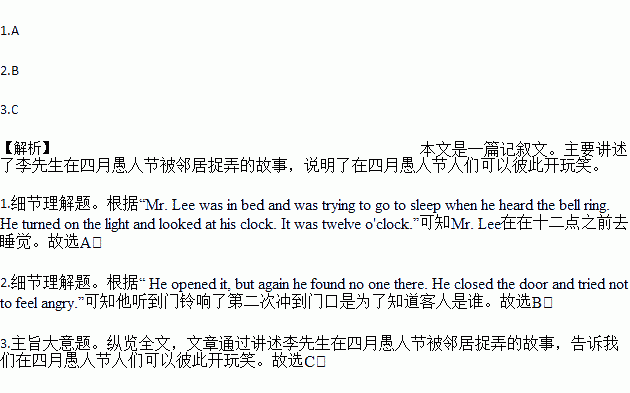题目内容
Mr. Lee was in bed and was trying to go to sleep when he heard the bell ring. He turned on the light and looked at his clock. It was twelve o'clock. "Who can it be at this time of night?" He thought. He decided to go and find out. So he got off bed, put on his dressing gown (浴袍) and went to the door. When he opened the door, there was nobody there. "That is very strange." Then he went back to his bedroom, took off his dressing gown, got back into bed, turned off the light and tried to go to sleep. A few minutes later he heard the bell again. Mr. Lee jumped out of bed very quickly and rushed to the door. He opened it, but again he found no one there. He closed the door and tried not to feel angry. Then he saw a piece of paper on the floor. He picked it up. There were some words on it : "It is now after midnight(午夜), so it is April Fools’ Day. April fool to you!"
"Oh, it was the English boy next door!" Mr. Lee exclaimed (惊叫) and almost smiled. He went back to bed and fell asleep at once. The bell did not ring again.
1.When did Mr. Lee go to bed?
A. before twelve o'clock B. after twelve o'clock
C. when the bell rang D. when he saw the boy
2.Why did he rush to the door when he heard the bell ring the second time?
A. He wanted to open the door for the visitor
B. He wanted to find out who the visitor was.
C. He was afraid of the ring
D. He was waiting for someone.
3.From this passage, we learn that we can _______ on April Fools’ Day.
A. say "Hello" to each other B. dance and sing at night
C. play jokes on each other D. send presents to children
 超能学典应用题题卡系列答案
超能学典应用题题卡系列答案

 . 4.. The way to a person's head is through his heart. Sometimes all it takes is a few seconds to connect an audience member with a story.
. 4.. The way to a person's head is through his heart. Sometimes all it takes is a few seconds to connect an audience member with a story. t do you 8.(meaning)?” Bob answered 9.(slow),"Well, when there's a party in town, it belongs to my daughter. 10. there's a football game somewhere, it belongs to my son. When I've washed it, and it looks really nice and clean, it belongs to my wife. And when it is dirty, it's mine."
t do you 8.(meaning)?” Bob answered 9.(slow),"Well, when there's a party in town, it belongs to my daughter. 10. there's a football game somewhere, it belongs to my son. When I've washed it, and it looks really nice and clean, it belongs to my wife. And when it is dirty, it's mine."